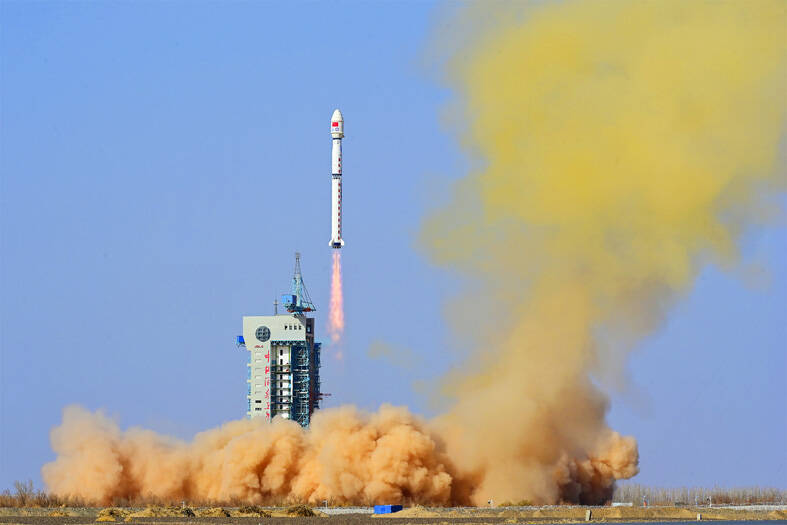Some debris from a rocket that took off from China’s Jiuquan Satellite Launch Center landed in waters off the north coast of Taiwan yesterday morning, the Ministry of National Defense said.
The debris fell within the area where China’s Fujian Maritime Safety Administration on Thursday last week said “aeronautic activities” would be held, the ministry said.
Due to the rocket launch, the Fujian agency banned ships from entering the area from 9am to 3pm yesterday, while China’s Civil Aviation Administration prohibited civil aircraft from entering the airspace around the area from 9:30am to 9:57am.

Photo: AP
“We were able to monitor the rocket launch using our military’s intelligence and surveillance systems. Some debris from the rocket fell into the waters that China had warned about last week and did not affect our homeland security,” the ministry said.
Aircraft operating in the Taipei Flight Information Region (FIR), and ships navigating the waters off the north coast were safely guided by the Civil Aeronautics Administration and Maritime and Port Bureau respectively, the Ministry of Transportation and Communications said.
The Maritime and Port Bureau continued monitoring shipping routes until 5pm yesterday, the transport ministry said.
Between 9am and 10am, about 33 flights in the Taipei FIR were affected by China’s launch: 14 departing flights, 11 arriving flights and eight transit flights, Civil Aeronautics Administration data showed.
On average, each flight reported a delay of about five to 10 minutes, as they were instructed to take an alternative route, the aviation agency said.
Air traffic controllers in Taiwan and Japan coordinated in advance to ensure that flights would operate safely, smoothly and in an orderly manner, it said.
The rocket was reported to have been carrying the Fengyun-3 07, a Chinese-made meteorological satellite, national security officials said.
Institute for National Defense and Security Research research fellow Shen Ming-shih (沈明室) yesterday said that the launch might be part of the Chinese Communist Party’s (CCP) efforts to develop a fractional orbital bombardment system (FOBS).
“Through the launch, they might gain an understanding of the parameters and prepare for a launch of the FOBS,” he said. “We should observe if a military vessel was dispatched to fetch the rocket debris, or if the launch was held following the military exercises around Taiwan to amplify cognitive warfare” against the nation.
Institute research fellow Shu Hsiao-huang (舒孝煌) said the CCP claimed that it had launched a meteorological satellite to monitor heavy rainfall in regions of low-to-middle latitudes and prevent damage caused by natural disasters.
“Judging from the way that the CCP set up the no-fly zone for the rocket launch, it might start using the same tactic more frequently to disrupt Taiwan’s civil aviation services. Relevant government agencies should formulate countermeasures in advance,” Shu said.
Additional reporting by CNA

The combined effect of the monsoon, the outer rim of Typhoon Fengshen and a low-pressure system is expected to bring significant rainfall this week to various parts of the nation, the Central Weather Administration (CWA) said. The heaviest rain is expected to occur today and tomorrow, with torrential rain expected in Keelung’s north coast, Yilan and the mountainous regions of Taipei and New Taipei City, the CWA said. Rivers could rise rapidly, and residents should stay away from riverbanks and avoid going to the mountains or engaging in water activities, it said. Scattered showers are expected today in central and

COOPERATION: Taiwan is aligning closely with US strategic objectives on various matters, including China’s rare earths restrictions, the Ministry of Foreign Affairs said Taiwan could deal with China’s tightened export controls on rare earth metals by turning to “urban mining,” a researcher said yesterday. Rare earth metals, which are used in semiconductors and other electronic components, could be recovered from industrial or electronic waste to reduce reliance on imports, National Cheng Kung University Department of Resources Engineering professor Lee Cheng-han (李政翰) said. Despite their name, rare earth elements are not actually rare — their abundance in the Earth’s crust is relatively high, but they are dispersed, making extraction and refining energy-intensive and environmentally damaging, he said, adding that many countries have opted to

SUPPLY CHAIN: Taiwan’s advantages in the drone industry include rapid production capacity that is independent of Chinese-made parts, the economic ministry said The Executive Yuan yesterday approved plans to invest NT$44.2 billion (US$1.44 billion) into domestic production of uncrewed aerial vehicles over the next six years, bringing Taiwan’s output value to more than NT$40 billion by 2030 and making the nation Asia’s democratic hub for the drone supply chain. The proposed budget has NT$33.8 billion in new allocations and NT$10.43 billion in existing funds, the Ministry of Economic Affairs said. Under the new development program, the public sector would purchase nearly 100,000 drones, of which 50,898 would be for civil and government use, while 48,750 would be for national defense, it said. The Ministry of

UNITED: The other candidates congratulated Cheng on her win, saying they hoped the new chair could bring the party to victory in the elections next year and in 2028 Former Chinese Nationalist Party (KMT) lawmaker Cheng Li-wun (鄭麗文) yesterday won the party’s chair election with 65,122 votes, or 50.15 percent of the votes. It was the first time Cheng, 55, ran for the top KMT post, and she is the second woman to hold the post of chair, following Hung Hsiu-chu (洪秀柱), who served from 2016 to 2017. Cheng is to succeed incumbent Eric Chu (朱立倫) on Nov. 1 for a four-year term. Cheng said she has spoken with the other five candidates and pledged to maintain party unity, adding that the party would aim to win the elections next year and